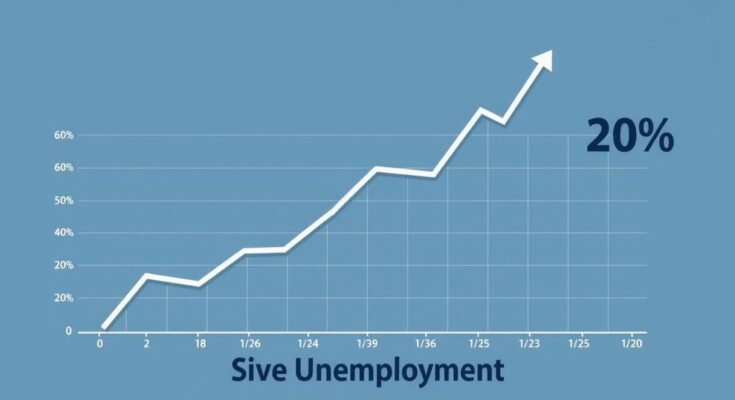Argentina’s unemployment rose to 6.4% in Q4 2024, an increase from the previous year. The hotel sector saw a decline in foreign tourists, while local tourism increased. Economic challenges persist as inflation is curbed, yet a demand for the dollar pressures reserves. The report highlights the educational background of the unemployed population and reiterates the need for strategic financial assistance.
According to a report by the National Institute of Statistics and Census (Indec), unemployment in Argentina climbed to 6.4% in the fourth quarter of 2024, representing an increase of 0.7 percentage points from 5.7% in the same quarter of 2023, though it showed a decrease of 0.5 points compared to Q3 2024 (6.9%). Unemployment rates were notably higher in Greater Buenos Aires at 7.1% and lower in Patagonia at 4%. Furthermore, the statistics revealed that women faced higher unemployment rates (6.9%) than men (6.1%).
The report indicated that 72.5% of the unemployed individuals have been jobless for less than a year, while 27.6% have been unemployed for a more extended period. Labor market pressures, combining unemployed, underemployed, and job seekers, rose to 29.4%, increasing by 2 percentage points year-on-year. An estimated 1.47 million individuals are currently unemployed, which is 180,000 more than the previous year.
In February 2025, the hotel occupancy rate in Argentina saw a slight decline of 0.2% year-on-year, with 1.97 million travelers recorded. The rise in the local peso’s value against the US dollar has deterred international tourists, making local prices excessively high. While domestic travel by residents increased by 4.6%, the number of non-residents decreased by 14.7%. Total overnight stays dropped to 5.6 million, which displayed a 1.2% decrease year-on-year.
Buenos Aires province accounted for the highest percentage of overnight stays at 27.8%, followed by Patagonia at 22.6%. The average hotel stay lasted 2.8 nights, with parahotel accommodations slightly higher at 3.4 nights. The most popular tourist destinations within the country include Mar del Plata (Buenos Aires Province), San Carlos de Bariloche (Río Negro Province), and Villa Carlos Paz (Córdoba Province).
The government under President Javier Milei has made efforts to reduce inflation, achieving a decrease from 211% in 2023 to 117% in 2024. However, economic activity is stagnating due to a depreciating dollar, threatening Central Bank reserves, prompting the government to consider seeking an IMF loan by mid-April to reinforce reserves amidst growing uncertainties regarding the dollar’s value.
Among an urban population of 29.8 million in Argentina, the economically active population comprises 14.5 million individuals. Of these, 13.6 million are employed, while nearly one million remain unemployed yet actively job-seeking. Educational attainment among the unemployed indicates that 71.2% have completed high school, while only 28.9% have experienced college education, regardless of degree completion.
The unemployment rate in Argentina has increased to 6.4% in the fourth quarter of 2024, although showing a decrease from the previous quarter. Economic pressures are evident, with a significant portion of the unemployed being without jobs for less than one year. The hospitality sector suffered a decline in both traveler numbers and hotel occupancy, while the government’s proactive measures to control inflation face challenges due to a fluctuating dollar. Overall, economic stability remains a prominent concern that necessitates careful management going forward.
Original Source: en.mercopress.com




